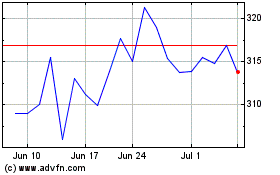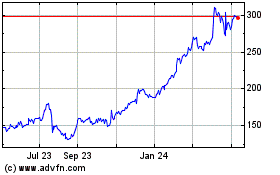By Anne Steele
Spotify's pandemic boost may be peaking.
The Swedish audio-streaming giant posted stronger-than-expected
subscription growth in the fourth quarter of 2020 as more listeners
tuned into music and podcasts from home amid the coronavirus
pandemic. Still, the company offered a conservative outlook for the
current year as new sign-ups could ebb.
Shares in Spotify Technology SA fell 9% Wednesday morning in New
York to $315.
The pandemic proved to be a boon for streaming content as
lockdowns across the world had consumers turning to screens and
smart speakers for entertainment.
"In a way it's been one of the most interesting social
experiments I've ever seen in real time with a billion-plus people
overnight changing pretty much everything about their habits,"
Spotify Chief Executive Daniel Ek said in an interview. "Assuming
Covid is beyond us in the latter part of 2021, what's going to
happen to consumption then? Are people going to travel? What habits
are changing? That's a massive amount of uncertainty to have
consumers' attention now competing with all other forms of things
they could be doing with their time."
The disruption in listening habits and consumption "caused us to
pull forward subscribers across the back half of 2020, which makes
it hard to predict if we'll drive the same subscriber growth in the
year ahead," Mr. Ek said on a call with investors.
At the end of the fourth quarter, Spotify had 345 million
monthly active users, hitting the high end of its guidance, an
increase of 27% from the same period a year ago. Paying
subscribers, its most lucrative type of customer, grew to 155
million, up 24% from the same period a year ago, and topping
expectations.
Average revenue per user for the subscription business fell 8%
to EUR4.26, the equivalent of $5.13, from a year ago, as the
company continued to attract new subscribers via discounted plans
and charge lower prices in new markets such as India and Russia. In
October, Spotify raised the price of its family plan in seven
markets, a move the company said didn't affect churn or customer
intake. In February, it expanded price increases to another 25
markets, including in Europe, Latin America and Canada.
Revenue from subscriptions rose 15% from the year before, to
EUR1.89 billion. Advertising revenue grew for a second consecutive
quarter after sliding in the first half of the year amid pandemic
headwinds, jumping 29% to EUR281 million. Advertising, historically
less than 10% of Spotify's top line, accounted for 13% of revenue.
It has become a growth area as the company expands its podcast
business.
The company said it now has 2.2 million podcasts available on
its service, and consumption hours nearly doubled from the
prior-year quarter. During the period, 25% of its monthly active
users listened to a podcast, up from 22% in the previous quarter.
In December, "The Joe Rogan Experience," which arrived on Spotify
in September, became exclusive to the service. It is the No. 1 show
in 17 markets, and has helped bring in new users as well as attract
first-time podcast listeners, the company said.
"We do believe Joe Rogan has contributed positively to user
growth," said finance chief Paul Vogel on the investor call.
Spotify may soon be facing competition from bigger rivals, with
Amazon.com Inc. ramping up its commitment to podcasts with its
purchase of Wondery, and Apple Inc. exploring a subscription
service for podcasting.
Mr. Ek said the interest validates Spotify's early move into the
space, and said the focus going forward is on ramping up production
through the studios it's already acquired. He also said Spotify
will commit to making money on podcasts not just through
advertising, but through subscription and a la carte payment as
well.
"We're in the early days of seeing the long term evolution of
how we can monetize audio on the internet," he said. "I don't think
it's one size fits all and you'll have all these models."
In music, sponsored recommendations -- a cornerstone of
Spotify's "two-sided marketplace," where it charges artists and
labels for marketing on the service -- increased 50% from the prior
quarter. Billings rose 82% thanks to campaigns promoting albums by
Bad Bunny, Taylor Swift and Trippie Redd.
Overall revenue for the quarter rose 17% to EUR2.17 billion, in
line with guidance.
The company posted a loss of EUR125 million, or 66 European
cents a share, compared with a loss of EUR209 million, or EUR1.14 a
share, the year before. While Spotify has periodically reported a
quarterly profit, executives have said it would continue to give
priority to growth -- attracting new subscribers and investing in
podcasting.
Free cash flow -- a measure of the cash a company generates from
operations, and viewed by many investors as a proxy for performance
-- was EUR74 million, down from EUR169 million in the previous
year's period, in part due to higher podcast-related payments.
For the first quarter of 2021, the company forecast monthly
active users to grow to between 354 million and 364 million, and
premium subscribers to increase to between 155 million and 158
million. It said it expects to generate revenue of EUR1.99 billion
to EUR2.19 billion.
For this year, Spotify said it expects to grow its monthly
active users to 407 million to 427 million, and grow its premium
subscribers to 172 million to 184 million. It forecast revenue
growth between EUR9.01 billion and EUR9.41 billion. Analysts were
looking for EUR9.57 billion. If Spotify reaches the high end of its
expectations this year, the guidance represents year-over-year
subscription growth of 19%, a slower rate than last year's 25%
increase.
Mr. Ek said it's difficult to forecast how Spotify will perform
when introducing the service to new markets -- most recently South
Korea, following debuts in India and Russia. While the company
tends to be conservative with those estimates, it leaves the
potential to outperform, he said.
"When I look at the future slate of originals and exclusives,
that is a massive unknown but a massive potential upside too," said
Mr. Ek. "What happens when we have hundreds of shows exclusive?
Those things compound."
News Corp's Dow Jones & Co., publisher of The Wall Street
Journal, has a content partnership with Spotify's Gimlet Media
unit.
Write to Anne Steele at Anne.Steele@wsj.com
(END) Dow Jones Newswires
February 03, 2021 11:07 ET (16:07 GMT)
Copyright (c) 2021 Dow Jones & Company, Inc.
Spotify Technology (NYSE:SPOT)
Historical Stock Chart
From Mar 2024 to Apr 2024

Spotify Technology (NYSE:SPOT)
Historical Stock Chart
From Apr 2023 to Apr 2024
